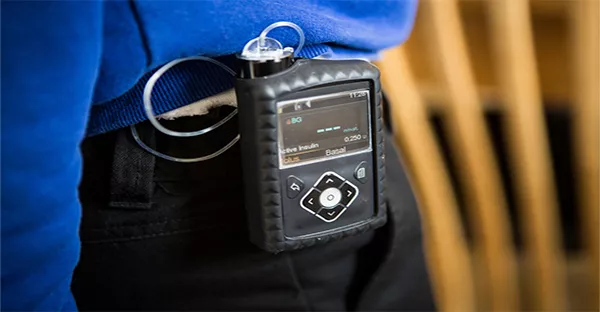
People living with diabetes who use an insulin pump or continuous glucose monitor have been asked to report any safety problems with their device without delay to the Yellow Card scheme.
The Yellow Card reporting scheme has been set up by the Medicines and Healthcare products Regulatory Agency (MHRA) so the MHRA can identify safety concerns that might require action.
More than 5.6 million people are estimated to be living with diabetes in the UK, and technology such as insulin pumps and continuous glucose monitors (CGMs) can significantly improve their quality of life.
However, sometimes incidents can happen with diabetes technology where these devices don’t work as intended, which can potentially lead to the incorrect amount of insulin being delivered. Most of the time these events don’t result in serious incidents, but sometimes they can result in potentially serious health consequences.
How to use the Yellow Card scheme
The MHRA has published new step-by-step guidance on how to report any safety concerns with your device, and what information to include.
Examples of the types of issue with CGMs and insulin pumps that should be reported include:
- Concerns with the accuracy of delivery from an insulin pump (for example, suspected underdose or overdose, unexpected bolus doses or non-delivery of insulin)
- Concerns with the accuracy of results from a CGM
- Connectivity issues between the various parts of different connected diabetes technology, such as insulin pumps and CGMs
- Concerns with a touchscreen, display or buttons
- Physical failures, including leaks and cracks.
The MHRA also urges anyone impacted by a safety issue relating to their device to speak to their healthcare team without delay.
Douglas Twenefour, Head of Care at Diabetes UK, said:
“Diabetes technology can be a life-changing tool, helping people living with the condition improve their quality of life.
“Unfortunately, we know that sometimes this technology doesn’t work as intended, so it is important that users of diabetes tech have a clear and accessible way to report any issues with continuous glucose monitors, insulin pumps and pens.
“Diabetes UK welcomes any guidance that gives reassurance for people using diabetes tech to highlight potential problems quickly and easily. We would encourage anyone with a concern about diabetes tech to report it, as this vital information can help improve the quality of devices.
“However, if there is any immediate concern about technology that could affect a person’s safety, advice from an appropriate healthcare professional should be sought first.”
Dr Alison Cave, MHRA Chief Safety Officer, added:
“Every report is valuable to us as it will provide valuable insight and potentially inform future regulatory measures designed to protect patients. We are ready to take whatever action is needed.”
Professor Partha Kar, NHS England Type 1 Diabetes & Technology lead, said:
“We welcome this work and its important role in ensuring safety while we oversee the widespread adoption of diabetes technologies using continuous glucose monitors and insulin pumps.
“This initiative will help to ensure standards stay at the highest level as the market continues to expand with new developers.”
If you are concerned that there is an issue with any of your diabetes devices, you can complete a Yellow Card report online using the Yellow Card website or via the free Yellow Card app.
